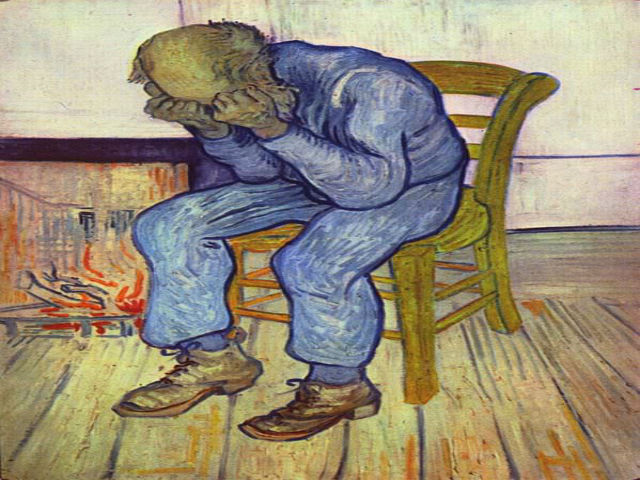Getting Through The Holidays With Depression Is Rough, But Doable
By Ben Kramer in Miscellaneous on Nov 23, 2016 6:40PM

Van Gogh painting via vangogh.net
Come Thanksgiving, Christmas and New Year’s, there’s lots of talk of love and happiness, joy to the world, the most wonderful time of the year etc. We’re told to be happy. And yet, I’m not.
Depression and anxiety are consistent for me, the friends I don’t want but can always count on. No matter how much Klonopin I take, or how much I drink, self-doubt and thoughts of inadequacy remain. Come holiday time, these dark emotions become magnified, and this is no coincidence.
“I think any pre-existing problems or issues can get put under a spotlight during the holidays,” says Dr. Michelle Gavin of the Family Institute at Northwestern. She believes comparison, particularly comparing ourselves to others, is what heightens our depression, especially around holiday time. And an easy way to compare our lives to others is by scrolling through Facebook and Instagram accounts. Seeing people with beautiful partners, homes, and Thanksgiving dinners could make us feel disappointed in our own situation as we observe, “these idealized versions of what the holidays look like for other people,” Gavin said.
“These are people’s highlight reels,” says Ruth Field, a social worker in Northfield who runs her own private practice and does work at the Josselyn Center. “Most people don’t share on social media the day to day difficulties, challenges, [and] stuff of life.”
Regardless, people tend to measure their real life to the “highlight” life of others, worsening their depression. We lose sight of what’s good in our life by nitpicking what we don’t have.
“When you’re comparing yourself to other people,” says Gavin, “it’s easier to see what isn’t there. And it’s easier to overlook what you do have.”
That’s the biggest mistake I, and several others, make during this holiday depression. We ignore the good. And it’s easy to dismiss because the good feels routine. Good friends will always be there, a good beer will always be there (please don’t abuse alcohol during this time!), your Spotify account will always be there, etc. I often forget I’ve published plenty of work, for example, and that’s something to be proud of.
Unfortunately, and both Dr. Gavin and Field agree, it’s in human nature to focus on the bad in our lives. But taking the effort to recognize what’s good in your life, what you’re grateful for, will make the difference. It may sound hokey, but being grateful you’re not the Cleveland Browns during Christmas will put things in perspective.
Still, depression is remarkably strong. It’s inevitable you’ll have to face it again sooner or later. For me, I'm uncomfortable in my own skin, something lots of us struggle with. The anxieties of being bisexual, feeling lonely, and not having a "good" salaried job plague me. Around holiday time, I see plenty of family, and these insecurities intensify as they question me on my love life and career.
Year after year, it's the same questions. They include, “Are you still writing?”
“Are you dating?”
“You can’t work at the bakery forever. You know that, right?”
I love my family, but getting asked these questions becomes tiresome. It gets beyond annoying, and I know I’m not alone in this regard. We feel there’s this sense of obligation in seeing family come holiday time, but there’s no contract decreeing you must spend all of Thanksgiving with them. You can leave early. This is an option, and if things get overwhelming or uncomfortable take it!
Field suggests arranging this early exit ahead of time, with a supportive family member. That way, it won’t appear abrupt, and people won’t hound you with, “Leaving so soon?”
Knowing you can leave will remove some anxiety from these family events, making for a better time. And, more often than not, if you tell your family you need to leave early they’ll understand. I know my family does.
Of course, some people like seeing relatives during the holidays, and if you can't because you're in Chicago, they're in Reno, there are other things to do! Arrange a Friendsgiving. Check out Planes, Trains, and Automobiles at the Logan Theatre Thanksgiving night. Go for an afternoon run at Planet Fitness on Christmas Eve. You can watch football all day if you can't see friends or family during the holidays. It's okay!
Sometimes though, it's not distance that denies us from being with family. Sometimes, we no longer have the chance to spend Christmas with Dad because he’s passed away. The grief of mourning, coupled with the notion you must be happy during the holidays, make for bad bedfellows. Dr. Gavin mentions that people will see these months/holidays as anniversaries of passing. The first Thanksgiving without my Mother, for example. Loss doesn’t even have to include death. It can be a breakup, a divorce. The first Christmas without my kids. For these periods, the pain will not go away, initially. In time, it gets easier. Because as we move forward the sorrow dissipates, the suffering recedes. Accepting the loss, while never losing the memory of the person, will make you a happier person as time goes on.
Depression isn’t easy. The holidays pile it on, and it’s hard. But, as Field told me, “Hard is doable.” I fall to pieces watching the Island of Misfit Toys in Rudolph, mainly because I identify with them, but I put myself back together. Remember, the holidays are temporary. They go away. Depression may not, but if you stick with analyzing the good in your life, and building off that, you’ll feel much better. Humans are a resilient group, and we can get through anything. We can get through a bad day, and we can certainly endure a Thanksgiving dinner with our families.